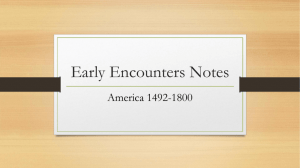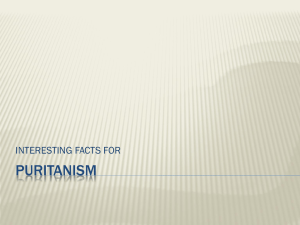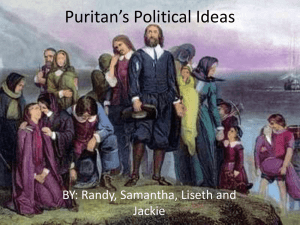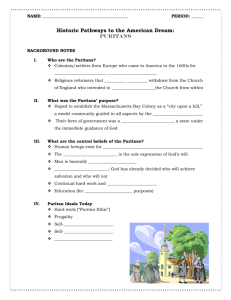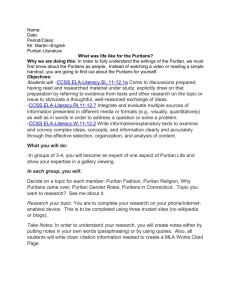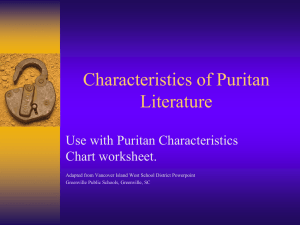Puritans Project
advertisement
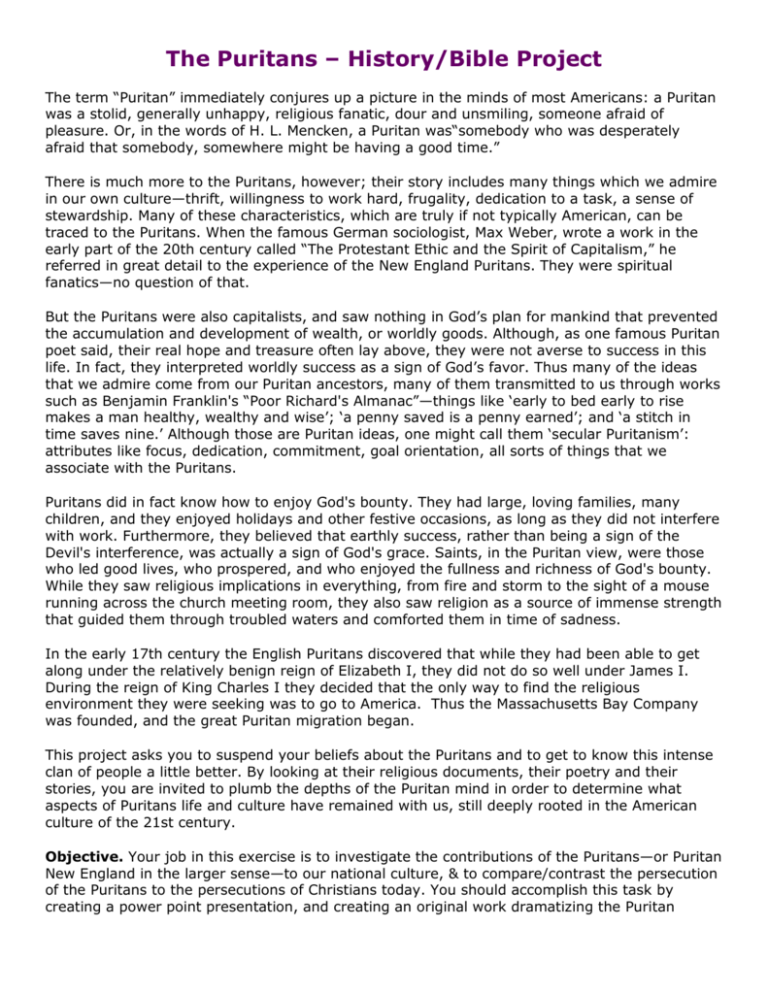
The Puritans – History/Bible Project The term “Puritan” immediately conjures up a picture in the minds of most Americans: a Puritan was a stolid, generally unhappy, religious fanatic, dour and unsmiling, someone afraid of pleasure. Or, in the words of H. L. Mencken, a Puritan was“somebody who was desperately afraid that somebody, somewhere might be having a good time.” There is much more to the Puritans, however; their story includes many things which we admire in our own culture—thrift, willingness to work hard, frugality, dedication to a task, a sense of stewardship. Many of these characteristics, which are truly if not typically American, can be traced to the Puritans. When the famous German sociologist, Max Weber, wrote a work in the early part of the 20th century called “The Protestant Ethic and the Spirit of Capitalism,” he referred in great detail to the experience of the New England Puritans. They were spiritual fanatics—no question of that. But the Puritans were also capitalists, and saw nothing in God’s plan for mankind that prevented the accumulation and development of wealth, or worldly goods. Although, as one famous Puritan poet said, their real hope and treasure often lay above, they were not averse to success in this life. In fact, they interpreted worldly success as a sign of God’s favor. Thus many of the ideas that we admire come from our Puritan ancestors, many of them transmitted to us through works such as Benjamin Franklin's “Poor Richard's Almanac”—things like ‘early to bed early to rise makes a man healthy, wealthy and wise’; ‘a penny saved is a penny earned’; and ‘a stitch in time saves nine.’ Although those are Puritan ideas, one might call them ‘secular Puritanism’: attributes like focus, dedication, commitment, goal orientation, all sorts of things that we associate with the Puritans. Puritans did in fact know how to enjoy God's bounty. They had large, loving families, many children, and they enjoyed holidays and other festive occasions, as long as they did not interfere with work. Furthermore, they believed that earthly success, rather than being a sign of the Devil's interference, was actually a sign of God's grace. Saints, in the Puritan view, were those who led good lives, who prospered, and who enjoyed the fullness and richness of God's bounty. While they saw religious implications in everything, from fire and storm to the sight of a mouse running across the church meeting room, they also saw religion as a source of immense strength that guided them through troubled waters and comforted them in time of sadness. In the early 17th century the English Puritans discovered that while they had been able to get along under the relatively benign reign of Elizabeth I, they did not do so well under James I. During the reign of King Charles I they decided that the only way to find the religious environment they were seeking was to go to America. Thus the Massachusetts Bay Company was founded, and the great Puritan migration began. This project asks you to suspend your beliefs about the Puritans and to get to know this intense clan of people a little better. By looking at their religious documents, their poetry and their stories, you are invited to plumb the depths of the Puritan mind in order to determine what aspects of Puritans life and culture have remained with us, still deeply rooted in the American culture of the 21st century. Objective. Your job in this exercise is to investigate the contributions of the Puritans—or Puritan New England in the larger sense—to our national culture, & to compare/contrast the persecution of the Puritans to the persecutions of Christians today. You should accomplish this task by creating a power point presentation, and creating an original work dramatizing the Puritan experience. You can work with a partner and your dramatic presentation must be between 3-5 minutes. Be creative, include costumes. Following are the questions you should address: Where do you find evidence that the Puritans were not as cold and unfeeling as they are sometimes portrayed? What was the connection between the Puritans and the Pilgrims? What can you conclude about the goals of the New England Puritans from the writings of William Bradford and John Winthrop? What does the poetry of Anne Bradstreet tell you about the Puritan heart and mind? What can you say about the Puritan economic system? In what sense was the Puritan economic model a forerunner of modern capitalism? Resources A place to start is at the Founding Fathers site. The first governor of the Massachusetts Bay Colony, John Winthrop, laid out the plans for the colonists in his “Model of Christian Charity.” A Puritanism in New England site at Gonzaga University. The Academic American New England page. The Fundamental Orders of Connecticut The Masachusetts Bay Colony Charter Mayflower Compact William Bradford's Journal Anne Bradstreet A site about Puritans at the University of Virginia Colonial Charters, Grants and Related Documents at Yale's Avalon Site Documents from the Puritan Era regarding the Salem witch trials. The University of Virginia American Studies program has an excellent section on the Puritans. Books: Bradstreet, Anne. The Works of Anne Bradstreet (The John Harvard Library) Miller, Perry. New England Mind: The Seventeenth Century Miller, Perry. The American Puritans Miller, Perry. New England Mind: From Colony to Province Morgan, Edmund S. Puritan Family Vaughn, Alden T., ed. The Puritan Tradition in America, 1620-1730 (Library of New England) Weber, Max. The Protestant Ethic and the Spirit of Capitalism (Routledge Classics) A Bibliography on Puritan New England This project is due October 16th. It will count as one test grade in history & one test grade in Bible. Even though you will need to work on this project at home, you will have 3 opportunities in class to work on this project. It is up to you to be prepared for these days and to use them wisely. You will be notified in advance of the days via the Middle School Messenger & Homework sheet.

